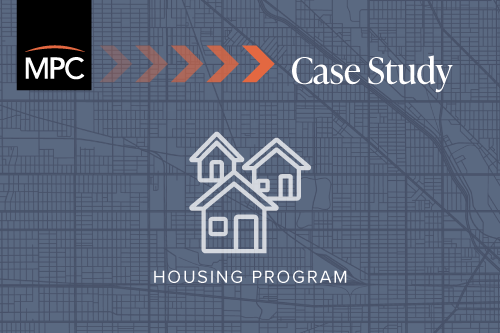University-Assisted Housing Program
Loyola University Chicago, City of Chicago, Cook County
Housing Program
Loyola University Chicago developed a unique employer-assisted housing program that benefits its employees and promotes public transit.

Policy background
Launched in March 2008, Loyola’s University-Assisted Housing (UAH) program provides financial assistance for employees to purchase homes. Working in partnership with the Metropolitan Planning Council, Loyola created a program through which faculty and staff can receive forgivable loans to use toward closing costs or down payment. Like other employer-assisted housing (EAH) programs, Loyola’s increases access to homeownership and affordability and encourages employees to live closer to work. EAH programs, like Loyola’s, also improve workforce stability, and the university benefits from increased employee engagement and reduced turnover.
Loyola’s program is unique in that it supports improved work-life balance for employees, fosters increased involvement in campus life, promotes public transit use and spurs investment in communities in the metropolitan area that surround Loyola campuses. Employees of Loyola’s Lake Shore and Water Tower Campuses must purchase homes in neighborhoods adjacent to the CTA’s Red Line to be eligible for the program. The program encourages employees to buy homes near the Red Line so they can conveniently use public transit to get to and from work. In August 2013, the University extended their UAH program to their Health Sciences Campus in Maywood, providing benefits to employees that choose to live in a number of West Cook County suburbs that neighbor the campus.
How it works
Each year, the UAH program provides up to 25 eligible employees with a five-year forgivable loan. The program is open to both faculty and staff members. Participants must be in “good standing,” and have worked full-time for Loyola for at least one year. Loyola works with the Northside Community Development Corporation to provide pre-purchase homeownership counseling for program participants, which has been proven to help people avoid foreclosure. UAH participants must complete the three-hour Home Buyer Education and Counseling course, as well as a housing access plan with Northside Community Development Corporation. In addition, participants must qualify for mortgage financing and be able to pay at least $1,000, or one percent of the home’s purchase price (whichever amount is greater), from their savings.
Employees can purchase homes in any neighborhood between the Howard Street and Roosevelt Road stops on the CTA’s Red Line, including in Rogers Park, Edgewater, Uptown, Lake View, Lincoln Park, the Near North Side and the Loop. Employees who purchase homes in Edgewater and Rogers Park, the two neighborhoods closest to Loyola’s main campus, receive higher loan amounts.
The UAH loan amount is determined by the employee’s income level and location of the purchased property. Employees who make at or below 120 percent Area Median Income (AMI), about $86,880 for a family of four in 2014, can receive a loan for $7,500 to live near the Red Line, and $10,000 to live in Rogers Park or Edgewater. Employees who make more than 120 percent AMI can receive $5,000 to live near the Red Line, and $7,500 to live in Rogers Park or Edgewater. Income guidelines and loan amounts for employees of the Health Sciences Campus are the same as above, with loan amounts varying depending on how close the employee chooses to live to campus.
The loan period is five years, during which the loan holder must remain employed by the university, maintain property ownership, occupy the property as his or her principle residence, and not refinance the property for cash. If the employee follows all of these stipulations, the loan is forgiven after the fifth year. If the loan holder does not meet these terms, the loan must be repaid immediately on a prorated basis.
Contact
Loyola University Chicago
773-508-3140, www.luc.edu
-
Goal
Help employees buy homes closer to work and increase access to homeownership, while also supporting the university’s local communities.
-
Target
Loyola University Chicago faculty and staff members who want to purchase a home near the CTA’s Red Line.
-
Financing
Loyola funds the loan program and homeownership counseling, and receives tax credits from the state for making these investments.
-
Success
As of January 2010, 128 Loyola employees have applied for the program and 47 have purchased homes.
-
Lessons learned
Prior to implementing the program, Loyola spent a great deal of time surveying its staff. All decision-makers at Loyola’s campuses participated, at some point, in the program’s design process. Engaging these decision-makers helped them take ownership of the program.